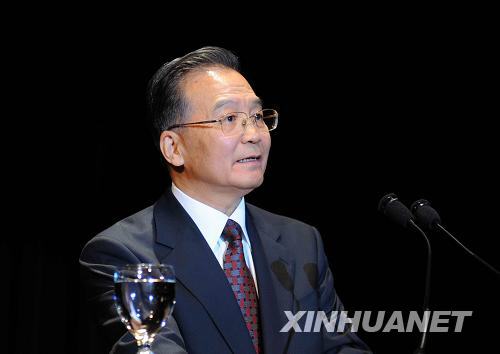
The People’s Republic of China



On September 23, 2008, Premier Wen Jiabao of the State Council attended a grand welcoming luncheon hosted by American friendly organizations in New York and delivered a speech entitled Forging into the Future and Joining Hands to Create a Better Tomorrow of China-U.S. Relations.
Wen said China-U.S. relations have made significant progress since his official visit to the U.S. in 2003. High-level contacts between the two sides are more frequent than ever before, and various dialogue and consultation mechanisms such as the strategic economic dialogue and strategic dialogue between the two countries have played an important role of enhancing bilateral strategic mutual trust. The bilateral trade volume has increased by almost one-and-a-half fold, and China and the U.S. are the second largest trade partners to each other. The two sides have expanded dialogue and cooperation to a number of new fields including energy sources and climate change and kept communication and coordination on global security issues such as counter-terrorism and non-proliferation and regional and international hot-spot issues such as the Korean Peninsula nuclear issue.
The deepening friendship between the two peoples is also an integral part of the growing China-U.S. relations, stressed Wen. He paid high regard to the Americans who have been committed to promoting China-U.S. friendship and extended sincere appreciation to the U.S. government and people for their great support for China’s earthquake relief and hosting of the Beijing Olympic Games.
As to the China-U.S. relations after the upcoming U.S. presidential election, he noted China firmly believes the bilateral relations will move forward no matter who becomes the next U.S. president. China and the U.S. are not rivals but partners. They may also become friends for the following reasons:
I. China and the U.S. have never enjoyed so extensive common interest as today. The China-U.S. cooperation, in terms of fields and significance, exerts an impact which goes far beyond the two countries and expands globally. The stable progress of bilateral relations serves the fundamental interest of the two peoples and complies with the trend of history.
II. Although China and the U.S. hold differences on some issues, with equal dialogues and consultations on the basis of mutual respect, they will be able to gradually reduce misgivings and deepen mutual trust.
III. Both the Chinese and the American people are tolerant, good at learning and embrace innovation. Two nations that appreciate and learn from each other should be able to live in amity and progress together.
IV. China sticks to the road of peaceful development, adheres to reform and opening up and pursues an independent foreign policy of peace. The development of China will neither hurt nor threat anyone.
Wen pointed out the Taiwan question always stands at the core of China-U.S. relations. History has shown the smooth development of China-U.S. relations, to a great extent, depends on the proper handling of the Taiwan question. China hopes the U.S. will honor its commitment, adhere to the one-China principle and the three China-U.S. joint communiqués, oppose “Taiwan independence” and support the improvement of relations and realization of common development between the two sides of the Taiwan Strait. It is good for the people on the two sides of the Taiwan Strait and beneficial to China-U.S. relations and peace in the world.
The Chinese government always attaches importance to developing China-U.S. relations. Its principle of promoting the constructive partnership between the two countries will never change no matter which American political party takes office in the White House. We sincerely hope the friendship and cooperation between China and the U.S. will blaze a broad way for big powers with different cultural background to coexist in harmony and develop side by side. We believe the biggest developing country and the largest developed one in the world are brave and smart enough to overcome any difficulty. We should forge into the future and join hands to create a better tomorrow.
Wen also answered questions on China’s food safety after making the speech. He said the Chinese government pays great attention to the recent infant milk powder contamination in the country and has taken a number of resolute measures. We need to learn lessons from the incident. First, we must ensure product quality, especially food safety. Businesses shall never seek growth at the cost of health and life of the people. Second, we must strengthen institutional construction. We must supervise and inspect strictly each of the links from raw material production, processing, circulation to consumption. Third, we must enhance social morals. In the body of a businessman should run the blood of morality. He noted China will adopt strong measures to ensure product quality and food safety. China’s food export will meet not only the international standards but also the requirement of the importing countries. China is willing to strengthen cooperation with the U.S. in that regard.
Wen’s speech received warm applauses from the audience. Chair of the Board of Directors of the National Committee on U.S.-China Relations Carla A. Hills, U.S. Secretary of Labor Elaine L. Chao and former Secretary of State Henry Kissinger also addressed the luncheon. They extended warm congratulations on the success of the Beijing Olympic Games and expressed the view that to strengthen U.S.-China cooperation is critical to maintaining world peace and stability and solving many global issues and challenges. The U.S. should continue to maintain contacts and cooperation with China.


